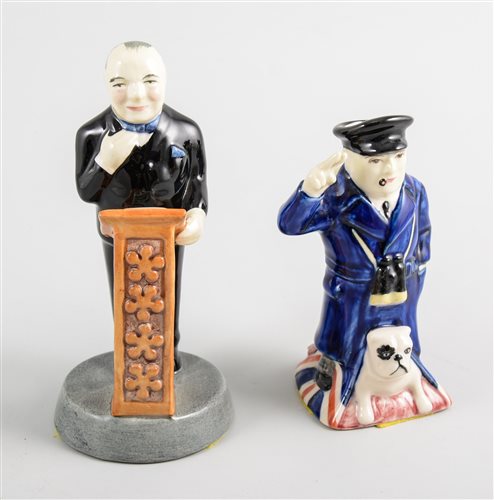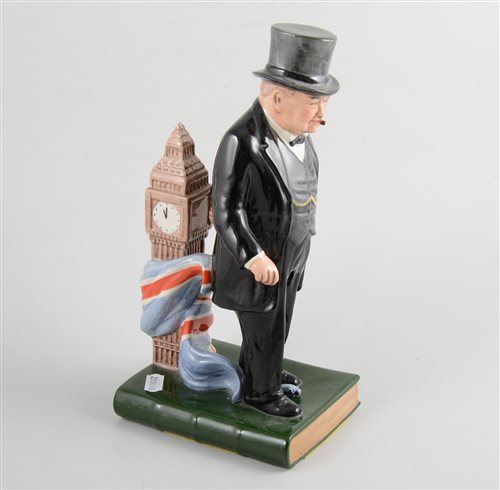Sir Winston Churchill
The Second World War. London: Cassell and Boston: Houghton Mifflin, 1948-53, CLEMENT ATTLEE'S COPY
mixed set (volume 1 only of the UK edition), authorial presentation inscriptions to volumes 2 ("To Clem Attlee from Winston S. Churchill 1949") and 5 ("To C.R. Attlee from Winston S. Churchill 1952") on front free endpapers; volume 1 with inscription recording the gift of the book to Attlee from his wife ("C.R.A. from V.H.A. October 1948"); first editions, 8vo, Churchill facsimile autograph presentation slips crudely pasted into volumes 1, 3-4, and 6, pencil annotations (not believed to be in Attlee's hand) to at least seven pages of volume 1 and a leaf of further manuscript notes in the same hand loosely inserted in the same volume; original cloth, corners bumped, spines dust-stained, some marks to covers, minor spotting to volume 1
"...By any reckoning, Winston Churchill was one of the greatest men that history records [...] He was brave, gifted, inexhaustible and indomitable. “Talk not of genius baffled, genius is master of man. Genius does what it must. Talent does what it can.” These lines describe him.
Energy, rather than wisdom, practical judgment or vision, was his supreme qualification. For energy I do not know who will rank with him outside Napoleon, Bismarck and Lloyd George. However, though his energy alone puts him in this class, it is not the full story of what he did to win the war. It was the poetry of Churchill, as well, that did the trick. Energy and poetry, in my view, really sum him up..." (Clement Attlee, from Churchill: By His Contemporaries)
A UNIQUELY IMPORTANT ASSOCIATION COPY: THE SET OF CHURCHILL'S SECOND WORLD WAR BELONGING TO HIS WARTIME DEPUTY PRIME MINISTER AND SUCCESSOR, CELEMENT ATTLEE. Churchill and Attlee's wartime partnership was built on mutual respect and contrasting personalities. Attlee was taciturn, modest, dry, unsentimental, and uncharismatic: "He is an admirable character, but not a man with whom it is agreeable to dine” (Churchill to Jock Colville). Attlee's calm, measured style, his managerial abilities, and his skills at handling committees, put him at the heart of the wartime administration without intruding on Churchill's place at centre stage. Following his victory over Churchill in the 1945 General Election, Attlee presided over one of the most consequential peacetime governments British governments of the twentieth century, inaugurating the Welfare State at home and beginning the painful process of decolonisation overseas. Attlee's unremarkable character was the subject of jokes and although Churchill was not above cruel witticisms - most famously when he agreed with Truman that Attlee was a modest man, but added "He has much to be modest about" - he did not take kindly when lesser men mocked Attlee. A joke did the rounds in Conservative circles after the war that "An empty taxi drew up outside Number Ten, Downing Street, and when the door opened, Attlee got out'', but Jock Colville recalled Churchill's response on being told this jibe: "Churchill did not smile. There was an 'awful' pause before his reply.' 'Mr. Attlee,' he said, 'is an honourable and gallant gentleman, and a faithful colleague who served his country well at the time of her greatest need. I should be obliged if you would make it clear whenever an occasion arises that I would never make such a remark about him, and that I strongly disapprove of anybody who does.'
Attlee mentioned these books in a 1954 article about his library: “There are the serried ranks of the war books. World War I includes a fine collection of books on the Gallipoli campaign inherited from a brother who was, like myself, a participant in that tragic adventure […] Then there is the Second World War, where the ranks are lad by the present Prime Minister’s great series, with Eisenhower and Montgomery in close support.” This charming articles gives an insight into both the important place books had in Attlee's life, and the reason for the lack of dust-jacket on these books:
“There they stand, two or three thousand of them; the accumulation of many years – old friends and newcomers. Many of them are seldom or never opened, but I should hate to be without them. They are part of my life. The seniors have for the most part been bought, many of the juniors are gifts from the authors, while others are the fruits of inheritance. They make a pleasant pattern of colour. Some are still fresh in bright bindings. I have ‘dust covers’. If they have come to stay why should they wear their overcoats?’” (from C.R. Attlee, ‘The Pleasure of Books’, The National and English Review, 1954)
For Clement Attlee, see also lots 253, 291, 315, 316, 348, and 375
LITERATURE:A240.4(I)b (Baylis printing); A240.1(II-IV).a; A240.1(V).b (first edition later printing); A240.1(VI)a
PROVENANCE:Clement Attlee presentation inscriptions (volumes 1, 2, 5) and bookplates (volumes 1-3, 6)
Sir Winston Churchill
The Second World War. London: Cassell and Boston: Houghton Mifflin, 1948-53, CLEMENT ATTLEE'S COPY
mixed set (volume 1 only of the UK edition), authorial presentation inscriptions to volumes 2 ("To Clem Attlee from Winston S. Churchill 1949") and 5 ("To C.R. Attlee from Winston S. Churchill 1952") on front free endpapers; volume 1 with inscription recording the gift of the book to Attlee from his wife ("C.R.A. from V.H.A. October 1948"); first editions, 8vo, Churchill facsimile autograph presentation slips crudely pasted into volumes 1, 3-4, and 6, pencil annotations (not believed to be in Attlee's hand) to at least seven pages of volume 1 and a leaf of further manuscript notes in the same hand loosely inserted in the same volume; original cloth, corners bumped, spines dust-stained, some marks to covers, minor spotting to volume 1
"...By any reckoning, Winston Churchill was one of the greatest men that history records [...] He was brave, gifted, inexhaustible and indomitable. “Talk not of genius baffled, genius is master of man. Genius does what it must. Talent does what it can.” These lines describe him.
Energy, rather than wisdom, practical judgment or vision, was his supreme qualification. For energy I do not know who will rank with him outside Napoleon, Bismarck and Lloyd George. However, though his energy alone puts him in this class, it is not the full story of what he did to win the war. It was the poetry of Churchill, as well, that did the trick. Energy and poetry, in my view, really sum him up..." (Clement Attlee, from Churchill: By His Contemporaries)
A UNIQUELY IMPORTANT ASSOCIATION COPY: THE SET OF CHURCHILL'S SECOND WORLD WAR BELONGING TO HIS WARTIME DEPUTY PRIME MINISTER AND SUCCESSOR, CELEMENT ATTLEE. Churchill and Attlee's wartime partnership was built on mutual respect and contrasting personalities. Attlee was taciturn, modest, dry, unsentimental, and uncharismatic: "He is an admirable character, but not a man with whom it is agreeable to dine” (Churchill to Jock Colville). Attlee's calm, measured style, his managerial abilities, and his skills at handling committees, put him at the heart of the wartime administration without intruding on Churchill's place at centre stage. Following his victory over Churchill in the 1945 General Election, Attlee presided over one of the most consequential peacetime governments British governments of the twentieth century, inaugurating the Welfare State at home and beginning the painful process of decolonisation overseas. Attlee's unremarkable character was the subject of jokes and although Churchill was not above cruel witticisms - most famously when he agreed with Truman that Attlee was a modest man, but added "He has much to be modest about" - he did not take kindly when lesser men mocked Attlee. A joke did the rounds in Conservative circles after the war that "An empty taxi drew up outside Number Ten, Downing Street, and when the door opened, Attlee got out'', but Jock Colville recalled Churchill's response on being told this jibe: "Churchill did not smile. There was an 'awful' pause before his reply.' 'Mr. Attlee,' he said, 'is an honourable and gallant gentleman, and a faithful colleague who served his country well at the time of her greatest need. I should be obliged if you would make it clear whenever an occasion arises that I would never make such a remark about him, and that I strongly disapprove of anybody who does.'
Attlee mentioned these books in a 1954 article about his library: “There are the serried ranks of the war books. World War I includes a fine collection of books on the Gallipoli campaign inherited from a brother who was, like myself, a participant in that tragic adventure […] Then there is the Second World War, where the ranks are lad by the present Prime Minister’s great series, with Eisenhower and Montgomery in close support.” This charming articles gives an insight into both the important place books had in Attlee's life, and the reason for the lack of dust-jacket on these books:
“There they stand, two or three thousand of them; the accumulation of many years – old friends and newcomers. Many of them are seldom or never opened, but I should hate to be without them. They are part of my life. The seniors have for the most part been bought, many of the juniors are gifts from the authors, while others are the fruits of inheritance. They make a pleasant pattern of colour. Some are still fresh in bright bindings. I have ‘dust covers’. If they have come to stay why should they wear their overcoats?’” (from C.R. Attlee, ‘The Pleasure of Books’, The National and English Review, 1954)
For Clement Attlee, see also lots 253, 291, 315, 316, 348, and 375
LITERATURE:A240.4(I)b (Baylis printing); A240.1(II-IV).a; A240.1(V).b (first edition later printing); A240.1(VI)a
PROVENANCE:Clement Attlee presentation inscriptions (volumes 1, 2, 5) and bookplates (volumes 1-3, 6)














Testen Sie LotSearch und seine Premium-Features 7 Tage - ohne Kosten!
Lassen Sie sich automatisch über neue Objekte in kommenden Auktionen benachrichtigen.
Suchauftrag anlegen